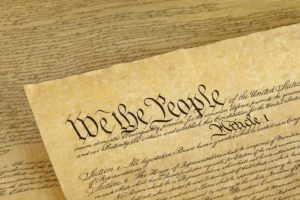The Rule of Law is “a durable system of laws, institutions, norms, and community commitment” based on “four universal principles”: “just law”; “open government”; “accessible and impartial justice”; and “the government as well as private actors are accountable under the law.”[1] The cornerstone of that system in this country is the United States Constitution.
“There is a story, often told, that upon exiting the Constitutional Convention Benjamin Franklin was approached by a group of citizens asking what sort of government the delegates had created. His answer was: ‘A republic, if you can keep it.’”[2] I came across no record of Franklin elaborating on this provocative statement. But what I take away from it is that we can only keep our republic if we are willing and able to do the hard work it takes to maintain it. In writing about Franklin’s statement, Professor Richard Beeman concludes: “If there is a lesson in all of this it is that our Constitution is neither a self-actuating nor a self-correcting document. It requires the constant attention and devotion of all citizens.”[3] The focus of this piece is the aspect of the above definition of the Rule of Law that pertains to community commitment.
Franklin’s views did not always carry the day during the Constitutional Convention. In fact, he observed: “I confess that there are several parts of this Constitution which I do not at present approve, but I am not sure I shall never approve them. For having lived long, I have experienced many instances of being obliged by better information, or fuller consideration, to change opinions even on important subjects, which I once thought right, but found to be otherwise.”[4] However, as discussed below, Franklin’s statement about “A republic, if you can keep it” does reflect a shared concern and understanding of the Founders.
Moreover, that concern is a continuing one on the part of thoughtful commentators, and empirical evidence demonstrates that there is substantial cause for concern today. The beneficial effects of civic education are not only desirable but necessary for our well-being as a nation. Consequently, as members of the legal profession, we should engage in and promote civic education that will support and strengthen the Rule of Law. Doing so is one of the ways we can deliver on the solemn promise we made when we took an oath to support and defend the Constitution and laws of the United States of America.
Other Founders Shared Franklin’s Concern
“[W]hat the American Founders did not do—could not do—was guarantee the success of their creation. Franklin and the other Founders knew that their experiment depended on future generations, which meant the education of future citizens.”[5] “Shortly after the Constitution was signed, Jefferson wrote from Paris: ‘Wherever the people are well informed, they can be trusted with their own government.’”[6] In his first inaugural address, George Washington stated: “The preservation of the sacred fire of liberty, and the destiny of the Republican model of Government, are . . . staked on the experiment entrusted to the hands of the American people.”[7] “For his part, John Adams observed that ‘liberty cannot be preserved without a general knowledge among the people.’”[8] It is telling that on May 19, 1821, Adams wrote to Jefferson: “A free government is a complicated piece of machinery, the nice and exact adjustment of whose springs, wheels, and weights, is not yet well comprehended by the artists of the age, and still less by the people.”[9]
In a piece titled “Civic Illiteracy and the Rule of Law,” in which he recounts the story about Franklin’s statement when exiting the Constitutional Convention, Judge Don R. Willett writes that “[t]he survival of freedom depends on people, not parchment.”[10] Willett goes on to direct our attention to the very beginning of the Constitution, reminding us that “We the People of the United States” is “supersized on the page for all the world to see.”[11] Thus while the words “civic education” may not have been used, the necessity of it is something that has been recognized since the founding of our nation.
A Similar Concern Today about the Need for Civic Education; We Should be Very Concerned
In his 2019 year-end report, Chief Justice John Roberts, Jr. called on us to live up to our responsibilities with respect to civic education. He wrote: “Civic education, like all education, is a continuing enterprise and conversation. Each generation has an obligation to pass on to the next, not only a fully functioning government responsive to the needs of the people, but the tools to understand and improve it.”[12]
Others have highlighted the consequences of neglecting civic education. In “Civic Illiteracy: A Threat to the American Dream,” Michael Ford wrote: “The effects of civic illiteracy take their toll over time, and while Americans are almost defiantly indifferent about their lack of civic understanding, the consequences to our basic rights and freedoms and the general health of our republic could be dire. The American Dream, which requires the rule of law and civic understanding to protect the freedoms and opportunities we value, could be deeply damaged.”[13] A report by the Educating for American Democracy Initiative describes our country’s situation as standing “at a crossroads of peril and possibility.”[14] Peril because “[i]n recent decades, we as a nation have failed to prepare young Americans for self-government, leaving the world’s oldest constitutional democracy in grave danger, afflicted by both cynicism and nostalgia, as it approaches its 250th anniversary.”[15] Possibility because “[o]ur civic strength requires excellent civic and history education to repair the foundations of our democratic republic” and we are capable of doing something about this situation.[16]
The consequences of civic illiteracy will be felt sooner than we might suspect. For “the middle and high school students of today will be tomorrow’s jurors, judges, court staff, lawyers, litigants, and journalists.”[17] And tomorrow is just around the corner.
In a 2018 lecture on civic education, Judge Robert A. Katzmann lamented that “[u]nfortunately, the Constitution’s ideals—and the way our system of government puts them in action—are lost on millions of Americans. Surveys show many have only a dim idea of how our government makes and applies laws. Most could not pass the test administered to prospective citizens.”[18] Also unfortunately, there is considerable evidence to support that statement.
In April of 2020, the National Center for Education Statistics released the results of the 2018 National Assessment of Educational Progress (NAEP) civics assessment. This civics assessment was first given in 1998 and has been administered every four years since 2006 to fourth-, eighth-, and twelfth-grade students. The results from the 2018 tests show that “about 24 percent of eighth-grade students performed at or above the NAEP Proficient level on the civics assessment, which was not significantly different from the 23 percent of students performing at this level in 2014, the previous assessment year. There was no significant change in the percentage of students performing at this level compared to 1998, the first assessment year.”[19] Studies show that the situation does not improve as students progress through high school. “Considerable evidence exists that appallingly large numbers of students would not pass the exam of basic civic knowledge required for naturalization. . . . By contrast, 92 percent of immigrants passed on their first try.”[20]
Nor does the situation improve as people move into adulthood. A national survey conducted by Xavier University’s Center for the Study of the American Dream revealed “that one in three native-born citizens failed the civic literacy test, based on the INS passing score of 6 out of 10 correct answers. This pass rate is 32 percent less than the average immigrant passing rate. In and of itself, these numbers don’t appear alarming because we have heard them before. However, our persistence in civic unawareness is no comfort simply because it is consistent.”[21]
Nor do we do better when presented with a relatively simple set of questions. The Annenberg Public Policy Center conducts an annual survey assessing Americans’ civic knowledge. During the period from 2006 through 2019, the percentage of people who could name the three branches of government remained below 40 percent.[22] Then, apparently as an unanticipated consequence of the pandemic, when the 2021 survey was taken 51 percent of the participants involved could name all three branches; this was up from the previous all-time high of 39 percent in 2020.[23] While that is an improvement, that is still a perturbingly low percentage, and post-pandemic our performance is likely to regress. This modest improvement does not undermine the accuracy of the statement that “We the People’s civic illiteracy is staggering.”[24]
Some of the Important Benefits of Civic Education
By our actions (or inaction) today we help create our nation’s citizenry of tomorrow. They will either have the knowledge, skills, and values that serve to support and strengthen the Rule of Law, or they will not. But there is no question but that they will definitely be in need of such knowledge, skills, and values, because it is no simple task to maintain a properly functioning system of laws and institutional norms.
Professor Beeman, writing about the Founders, observed that “they had not yet worked out fully the question that has plagued all nations aspiring to democratic government ever since: how to implement principles of popular majority rule while at the same time preserving stable governments that protect the rights and liberties of all citizens.”[25] Similarly, Professor Robert B. Talisse has written about the fact that “[d]emocracy imposes a substantial moral burden on citizens.”[26] He observes that as a consequence of the fact that “[d]emocracy is self-government among equals . . . , democracy runs on political disagreement.”[27] Thus, “democracy requires us to see our fellow citizens as our political equals, people who do not merely get an equal say in political decision-making but are entitled to an equal say. This of course is easy among those that agree. But there’s no easy way to regard our political opponents as equal citizens with an equal entitlement to political power.”[28]
Our system of laws and institutional norms has flaws because we, the human beings who designed that system, are flawed. Civic education can help counteract cynicism about and disillusionment with the legal system and the Rule of Law by helping people embrace the idea that living in a democracy means that you do not always get your preferred outcome, as well as understand that the fact that our legal system does not function perfectly is no reason to abandon that system instead of working to improve it. Civic education provides students and adults the opportunity to “observe and come to grips with the real-life complexities of doing justice.”[29]
Also, members of the legal profession can and should be exemplars of “the importance of civility and civil discourse,” and engaging in civic education is an opportunity for us to model and teach about that.[30] Civic education is an opportunity to “provide students with the skills to communicate effectively with others, even when they disagree.”[31]
Law professors Linda McClain and James Fleming wrote an essay in the Boston University Law Review about why “civic education is crucial to remedying what Jack Balkin, in The Cycles of Constitutional Time, diagnoses as ‘constitutional rot’ in the United States.”[32] They observed that civic education “helps to equip people for forms of democratic participation (including in social movements) necessary to the health of constitutional democracy.”[33] They explained that civic education “aspires to inculcate civic virtues and develop capacities for responsible constitutional self-government, for example:
- tolerance and respect for others who are different from ourselves;
- reciprocity in our relationships with others, including those with whom we disagree;
- mutual forbearance and trust . . . ;
- a willingness to meet people halfway (rather than to insist on our own way); and
- a disposition and capacity to give reasons (rather than merely to make assertions).”[34]
So I hope we can all agree that “[w]hen civics education is taught effectively, it can equip students with the knowledge, skills, and disposition necessary to become informed and engaged citizens.”[35]
One of the Things You Can Do
At the Business Law Section’s Spring Meeting in Seattle (April 27 to 29) we will be supporting Reading Partners Seattle by (i) donating to students books on topics related to Rule of Law, and (ii) arranging for some Section members to visit a school to read and talk about topics related to the Rule of Law.
This activity is being organized by the Pro Bono Committee and the Rule of Law Working Group, and you will learn more about it in the next issue of Business Law Today.
World Justice Project, What is the Rule of Law?, https://worldjusticeproject.org/about-us/overview/what-rule-law (last visited 2/14/23). ↑
Richard R. Beeman, Ph.D., Perspectives on the Constitution: A Republic, If You Can Keep It, National Constitution Center, https://constitutioncenter.org/education/classroom-resource-library/classroom/perspectives-on-the-constitution-a-republic-if-you-can-keep-it (last visited 2/14/23). ↑
Id. ↑
ConstitutionFacts.com, https://www.constitutionfacts.com/?section=funZone&page=famousQuotes.cfm (citing Benjamin Franklin, 1787) (last visited 2/14/23). ↑
Matthew Spalding, Ph.D., EDO70302b: A Republic If You Can Keep It (Jul. 3, 2002), https://www.heritage.org/political-process/commentary/ed070302b-republic-if-you-can-keep-it (last visited 2/14/23). ↑
Don R. Willett, Civic Illiteracy and the Rule of Law, 106 Judicature, Vol. 1, at 12, https://judicature.duke.edu/articles/civic-illiteracy-and-the-rule-of-law/ (internal citation omitted) (last visited 2/14/23). ↑
Id. at 11. ↑
Robert A. Katzmann, Civic Education and the Federal Courts, Thomas E. Fairchild Lecture, 2019 Wis. L. Rev. 397, at 400, https://wlr.law.wisc.edu/wp-content/uploads/sites/1263/2020/02/Katzmann-Final.pdf (citing John Adams, A Dissertation on the Canon and Feudal Law No. 3, Bos. Gazette (Sept. 30, 1765)) (last visited 2/14/23). ↑
ConstitutionFacts.com, https://www.constitutionfacts.com/?section=funZone&page=famousQuotes.cfm (citing John Adams to Thomas Jefferson, May 19, 1821) (last visited 2/14/23). ↑
Don R. Willett, Civic Illiteracy and the Rule of Law, 106 Judicature, Vol. 1, at 11, https://judicature.duke.edu/articles/civic-illiteracy-and-the-rule-of-law/ (last visited 2/14/23). ↑
Id. at 12. ↑
Chief Justice John G. Roberts, Jr., 2019 Year-End Report on the Federal Judiciary, U.S. Sup. Ct. (Dec. 31, 2019), https://www.supremecourt.gov/publicinfo/year-end/2019year-endreport.pdf (last visited 2/14/23). ↑
Michael Ford, Civic Illiteracy: A Threat to the American Dream (Apr. 30, 2012), HuffPost, https://www.huffpost.com/entry/civic-literacy_b_1457635 (last visited 2/14/23). ↑
Educating for American Democracy (EAD), Educating for American Democracy: Excellence in History and Civics for All Learners, iCivics (Mar. 2, 2021), https://www.educatingforamericandemocracy.org/wp-content/uploads/2021/02/Educating-for-American-Democracy-Report-Excellence-in-History-and-Civics-for-All-Learners.pdf (last visited 2/14/23). ↑
Id. ↑
Id. ↑
Rebecca Fanning, Involve, Inform, Inspire: Through Robust Civics Education Offerings, Federal Courts and Judges Teach the Next Generation About the Judiciary, 106 Judicature, Vol. 1, at 14 (2022), https://judicature.duke.edu/articles/involve-inform-inspire/ (last visited 2/14/23). ↑
Robert A. Katzmann, Civic Education and the Federal Courts, Thomas E. Fairchild Lecture, 2019 Wis. L. Rev. 397, at 399, https://wlr.law.wisc.edu/wp-content/uploads/sites/1263/2020/02/Katzmann-Final.pdf (last visited 2/14/23) ↑
Achievement-Level Results, The Nation’s Report Card, NAEP Report Card: Civics, https://www.nationsreportcard.gov/civics/results/achievement/ (last visited 2/14/23). ↑
Robert Holland & Don Soifer, What If Students Can’t Pass Immigrants’ Citizenship Test? (Sept. 28, 2014), Lexington Institute, https://www.lexingtoninstitute.org/what-if-students-cant-pass-immigrants-citizenship-test/ (last visited 2/14/23). ↑
Michael Ford, Civic Illiteracy: A Threat to the American Dream (Apr. 30, 2012), HuffPost, https://www.huffpost.com/entry/civic-literacy_b_1457635 (last visited 2/14/23). ↑
See Annenberg Public Policy Center, Americans’ Civics Knowledge Increases During a Stress-Filled Year (Sept. 14, 2021), https://www.asc.upenn.edu/news-events/news/americans-civics-knowledge-increases-during-stress-filled-year (last visited 2/14/23). ↑
See id. ↑
Don R. Willett, Civic Illiteracy and the Rule of Law, 106 Judicature, Vol. 1, at 12, https://judicature.duke.edu/articles/civic-illiteracy-and-the-rule-of-law/ (last visited 2/14/23). ↑
Richard R. Beeman, Ph.D., Perspectives on the Constitution: A Republic, If You Can Keep It, National Constitution Center, https://constitutioncenter.org/education/classroom-resource-library/classroom/perspectives-on-the-constitution-a-republic-if-you-can-keep-it (last visited 2/14/23). ↑
Robert B. Talisse, Democracy’s Burden (Aug. 23, 2020), Culturico, https://culturico.com/2020/08/23/democracys-burden/ (last visited 2/14/23). ↑
Id. ↑
Id. ↑
Rebecca Fanning, Involve, Inform, Inspire: Through Robust Civics Education Offerings, Federal Courts and Judges Teach the Next Generation About the Judiciary, 106 Judicature, Vol. 1, at 15 (2022), https://judicature.duke.edu/articles/involve-inform-inspire/ (last visited 2/14/23). ↑
Robin L. Rosenberg, Beth Bloom, & Hayley Lawrence, Critical Life Skills Through Courtroom Experiences, 106 Judicature, Vol. 1, at 34 (2022). ↑
Id. ↑
Linda C. McClain & James E. Fleming, Civic Education in Circumstances of Constitutional Rot and Strong Polarization, Abstract, 101 B.U. L. Review 1771 (2021). ↑
Id. at 1776-77. ↑
Id. ↑
Sarah Shapiro & Catherine Brown, The State of Civics Education (Feb. 21, 2018), American Progress, https://www.americanprogress.org/article/state-civics-education/ (last visited 2/14/23). ↑
This article is part of a series on intersections between business law and the rule of law, and their importance for business lawyers, created by the American Bar Association Business Law Section’s Rule of Law Working Group. Read more articles in the series.






